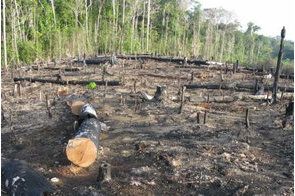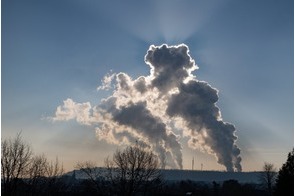SDGS on thin ice: Arctic warming and climate crisis in Nigeria

Summary
The ripple effects of Arctic warming already pose substantial socioeconomic risks that jeopardise Nigeria’s progress on its SDG targets.
Introduction
Nigeria’s sustainable growth and development is marked by the complex interplay between polar warming and local challenges. As one of the top 10 countries most vulnerable to climate risks, Nigeria grapples with the dual challenge of addressing these risks and reviving stalled progress across 11 of its stagnating Sustainable Development Goals (SDGs). The 2023 Sustainable Development Report shows that Nigeria currently scores 54.27 percent and ranks 146 out of 166 countries tracked by the SDG Index. This indicates that Nigeria still has a long way to go to achieve its SDG targets.
Amidst these challenges, the far-reaching impact of Arctic warming emerges as a lesser known, yet profound, factor. Arctic changes have global consequences, including extreme weather events and sea-level rise. In Nigeria, such consequences translate to intensified heat stress, food and water insecurity, and prolonged drought, all of which affect the local climate and ecosystems. These impacts also cast a shadow over Nigeria’s economic growth and sustainability ambitions, emphasising the intrinsic link between Nigeria’s SDGs future and the Arctic.
The Link between Arctic Change and Nigeria’s SDGs Progress
The Arctic is warming four times faster than the rest of the world. If the Arctic loses its sea ice and snow cover, global warming could accelerate by 25-40%, multiplying risks worldwide, including in Nigeria. Nine of the sixteen climate tipping points are in the polar regions with five out of the nine already close to tipping. While Arctic change alone is not solely responsible for climate shifts across Nigeria, factors such as increased solar energy absorption due to melting Arctic ice and altered jet streams arising from differential rates of warming, have knock-on effects on the country’s weather patterns. Resulting hot and dry conditions can cause heatwaves, drought, crop failure, and stronger cyclones.
Greenland’s rapidly melting ice sheet is currently the world’s largest contributor to sea level rise. Sea level rise is expected to increase Nigeria’s vulnerability to floods and waterborne diseases, impacting coastal communities throughout the country. Additionally, Nigeria’s relatively low adaptive capacity heightens its vulnerability to the climate crisis, making risks associated with extreme weather events more severe, and increasing uncertainty for key industries and business sectors. As a result, progress on the SDG target areas is jeopardised. Acknowledging the far-reaching consequences of Arctic warming is an essential step to mitigate climate change impacts in Nigeria and to secure a sustainable future for the state.
Climate Crisis Amplified by Arctic Melting: A Socioeconomic Risk for Nigeria
The SDGs are a global blueprint to bolster social welfare, targeting 17 vital areas that include education, health, gender equality, and social inclusion. Businesses play a pivotal role in pursuing economic growth and societal well-being. However, Nigeria’s key sectors – agriculture, water, energy, and health – are at significant risk from the climate crisis, which can lead to cascading socioeconomic ramifications.
Global climate risk, amplified by Arctic warming, threatens Nigeria’s pursuit of the SDGs and its socioeconomic landscape. Climate change is costing Nigeria’s economy 100 billion USD annually, representing about 11% of its GDP. If current climate trends persist, the nation could face a reduction of up to 30% of its GDP by 2050 and a 75% decline in GDP growth by 2100. Three factors required for sustainable growth – infrastructure, human capacity, and standard of living – could be severely impacted.
Infrastructure: A Foundation for Growth and SDG Progress: Robust infrastructure is a key cornerstone of socioeconomic development and a catalyst for advancing all SDGs. According to the Climate Risk Profile, Nigeria’s infrastructure exposure to extreme floods is expected to double by 2080. Central to driving economic growth is energy access, which fuels pivotal sector activities, fosters employment, powers education, and alleviates poverty.
Historically, Africa’s infrastructure gaps, including those of Nigeria, cast a shadow over businesses, with energy poverty contributing to escalated operational costs. Arctic warming increases the frequency of extreme weather events that can threaten the energy infrastructure that is essential for Nigeria’s economic growth. Nigeria’s reliance on the Kainji Dam, a hydroelectric powerhouse, further compounds this challenge. As the Arctic warms, unstable jet stream patterns can cause certain weather systems to become more persistent, leading to prolonged periods of rainfall or drought in different regions. This can lead to low water levels in dams, reducing their ability to generate the electricity needed for a stable energy supply essential for a thriving economy.
Standard of Living: A Key to Sustainable Growth: Raising the standard of living is crucial to boost citizens’ purchasing power and drive socioeconomic growth through favourable returns on business investments. Agriculture, which contributes to nearly 30% of Nigeria’s GDP and generates around 70% of employment, is impacted by these efforts. However, agriculture is one of the most vulnerable sectors to climate change impacts, particularly those that can be exacerbated by Arctic warming, such as drought. The International Monetary Fund (IMF) highlights the vulnerability of Nigeria’s agricultural sector to extreme flooding, a consequence of climate change cascading through Arctic melt. This poses a direct challenge to the progress of SDG 1 (No poverty) and SDG 2 (Zero hunger).
In late 2022, severe flooding exacted a heavy toll on 2.5 million Nigerians, which resulted in damages of approximately $3.4 billion, pushing many into poverty. Olam Rice Farm, a key player responsible for fulfilling 25% of Nigeria’s rice needs, suffered over US$20 million in losses due to this flood. This resulted in inflated food prices combined with income loss, further degrading the already reduced standard of living. To maintain a decent standard of living and reduce socioeconomic risks in Nigeria, it is imperative to consider the impacts and future risks of Arctic feedback effects in addressing climate change and SDG achievement.
Human Capital: The Backbone of Growth and SDG Advancement: A robust human capital base is crucial for business growth that can drive socioeconomic growth. However, Arctic warming poses significant socioeconomic risks to Nigeria, including health risks, property loss, water shortages, and food security, impacting progress across several SDGs. Today, Lake Chad has shrunk by 90% since the 1960s, affecting 30 million people in the region who rely on it for agricultural activities. This has led to the forced displacement of 2.3 million people across the Lake Chad Basin due to climate-fueled conflict arising from water scarcity, with over 5 million struggling to access enough food to survive.
Climate change impacts such as sea level rise have resulted in floods that have already affected 25 million Nigerians. According to the National Emergency Agency (NEMA), the 2022 flood destroyed more than 300,000 homes and displaced more than half a million people. Furthermore, climate-induced, heat-related mortality is projected to increase from about two to almost 10 deaths per 100,000 people per year by 2080. These impacts can reduce productivity and drive migration. This can reduce human capital and increase socioeconomic risks, thus deterring the progress of Nigeria’s SDG targets.
Conclusion
Nigeria is not on track to meet its SDGs goals. The ripple effects of Arctic warming already pose substantial socioeconomic risks that jeopardise Nigeria’s progress on its SDG targets. Hence, recognising the profound implications of Arctic warming becomes paramount to address the socioeconomic risks needed to revive progress on Nigeria’s SDGs targets.
To overcome these challenges, a coordinated policy and business effort that considers both local climate dynamics and broader global changes, such as Arctic warming, is essential. By taking into consideration global climate intricacies and implementing adaptive strategies and solutions, Nigeria can navigate these complexities and work towards a future where economic growth and sustainable development are attainable and resilient in the face of climate challenges.
Damilola Adeyanju is Executive Coordinator, Arctic Basecamp.
Related
-
Group advocates for progress on UN-REDD programme in Nigeria
The UN-REDD programme assists countries to develop the capacities needed to meet the requirements for carbon offsets, and ...
-
Getting the social cost of carbon right
Spending money today on climate action is like buying an insurance policy.
-
Gates Foundation commits $1.4 billion to climate adaptation at COP27
The $1.4 billion will, amongst other investments, support the Africa Adaptation Initiative (AAI) to quickly build a ...









